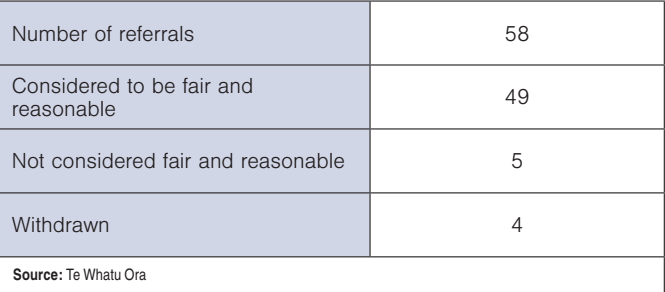Respiratory physician Lutz Beckert considers chronic obstructive pulmonary disease management, including the prevention of COPD, the importance of smoking cessation and pulmonary rehabilitation, and the lifesaving potential of addressing treatable traits. He also discusses the logic of inhaler therapy, moving from single therapy to dual and triple therapy when indicated, as well as other aspects of management
$42 fee gets a ‘no’: The highs and lows of fees review committee decisions
$42 fee gets a ‘no’: The highs and lows of fees review committee decisions

A general practice copayment of $42 for teens aged 14 to 17 was rejected by a committee reviewing fee rises last year.
This is disclosed in data supplied by Te Whatu Ora under the Official Information Act about copayment rises nationally that went before regional fees review committees from July to October.
New Zealand Doctor Rata Aotearoa asked for the highest and lowest fees approved and rejected by age group.
Te Whatu Ora had referred 58 practices’ fee rises to review committees, of which 49 were approved – recommended to be “fair and reasonable”. Five were not recommended as fair and reasonable, and four were withdrawn without recommendation.
The five rejected practice fee rises were all in Te Manawa Taki, the region that stretches from Taranaki to Tairāwhiti. In the Northern region (Auckland-Northland), 33 fee rises were referred, 29 were approved, and four were withdrawn. In the Central region (Hawke’s Bay, Whanganui and lower North Island), all 18 rises were approved, and in Te Wai Pounamu (South Island), both rises were approved.
Of the five rejected sets of fees, Te Whatu Ora says the lowest involved copayments of $0 for under-14s, $48 for teens aged 14–17 and $54 for everyone 18 or older.
The highest rejected set was, for the same age groups, $0, $42 and $55. The lowest individual age group fee was $42.
The highest set of approved fees was in the Northern region – $0 for those under 14 and $85 for all others. The lowest individual age group approved fee was $16.50 for the 14–17 age group in Te Wai Pounamu.
Te Whatu Ora says the average approved fees by age group were $0 under 14, $42.01 for 14–17, $52.96 for 18– 24, $55.45 for 25–44 and 45–64, and $53.05 for 65-plus.
Astuti Balram, the group manager of primary care in the living well commissioning group, says in the response letter that the fee review process is set out in the PHO Services Agreement, Fees Framework (clause F.22).
Ms Balram says PHOs must notify Te Whatu Ora of all rises in fees charged to enrolled people by contracted providers for standard GP consultations. If the agency is notified of a rise more significant than a reasonable level when compared with the Annual Statement of Reasonable Fee Increases (ASRFI), it may, within one month, refer the increased fees to a regional fees review committee.
“Te Whatu Ora does not automatically refer for review all fee increases above the ASRFI. Te Whatu Ora local commissioning teams assess notified fee increases in discussion with the PHO…”
Those teams consider:
- the affordability of the increased fees for the provider’s enrolled population
- the availability of other local providers, and a comparison with their fees, and
- the extent to which the fee rise is necessary to maintain or improve the capacity of the provider to meet the needs of its enrolled population.
“Te Whatu Ora senior commissioning managers are responsible for deciding whether to refer fee increases above the ASRFI to an RFRC [regional fees review committee] for review.”
TELL US WHAT YOU THINK
You can add your comments using the comment function below, or by sending a Letter to the Editor to editor@nzdoctor.co.nz








![Barbara Fountain, editor of New Zealand Doctor Rata Aotearoa, and Paul Hutchison, GP and senior medical clinician at Tāmaki Health [Image: Simon Maude]](/sites/default/files/styles/thumbnail_cropped_100/public/2025-03/Barbara%20Fountain%2C%20editor%20of%20New%20Zealand%20Doctor%20Rata%20Aotearoa%2C%20and%20Paul%20Hutchison%2C%20GP%20and%20senior%20medical%20clinician%20at%20T%C4%81maki%20Health%20CR%20Simon%20Maude.jpg?itok=-HbQ1EYA)
![Lori Peters, NP and advanced health improvement practitioner at Mahitahi Hauora, and Jasper Nacilla, NP at The Terrace Medical Centre in Wellington [Image: Simon Maude]](/sites/default/files/styles/thumbnail_cropped_100/public/2025-03/2.%20Lori%20Peters%2C%20NP%20and%20advanced%20HIP%20at%20Mahitahi%20Hauora%2C%20and%20Jasper%20Nacilla%2C%20NP%20at%20The%20Terrace%20Medical%20Centre%20in%20Wellington%20CR%20Simon%20Maude.jpg?itok=sUfbsSF1)
![Ministry of Social Development health and disability coordinator Liz Williams, regional health advisors Mary Mojel and Larah Takarangi, and health and disability coordinators Rebecca Staunton and Myint Than Htut [Image: Simon Maude]](/sites/default/files/styles/thumbnail_cropped_100/public/2025-03/3.%20Ministry%20of%20Social%20Development%27s%20Liz%20Williams%2C%20Mary%20Mojel%2C%20Larah%20Takarangi%2C%20Rebecca%20Staunton%20and%20Myint%20Than%20Htut%20CR%20Simon%20Maude.jpg?itok=9ceOujzC)
![Locum GP Helen Fisher, with Te Kuiti Medical Centre NP Bridget Woodney [Image: Simon Maude]](/sites/default/files/styles/thumbnail_cropped_100/public/2025-03/4.%20Locum%20GP%20Helen%20Fisher%2C%20with%20Te%20Kuiti%20Medical%20Centre%20NP%20Bridget%20Woodney%20CR%20Simon%20Maude.jpg?itok=TJeODetm)
![Ruby Faulkner, GPEP2, with David Small, GPEP3 from The Doctors Greenmeadows in Napier [Image: Simon Maude]](/sites/default/files/styles/thumbnail_cropped_100/public/2025-03/5.%20Ruby%20Faulkner%2C%20GPEP2%2C%20with%20David%20Small%2C%20GPEP3%20from%20The%20Doctors%20Greenmeadows%20in%20Napier%20CR%20Simon%20Maude.jpg?itok=B0u4wsIs)
![Rochelle Langton and Libby Thomas, marketing advisors at the Medical Protection Society [Image: Simon Maude]](/sites/default/files/styles/thumbnail_cropped_100/public/2025-03/6.%20Rochelle%20Langton%20and%20Libby%20Thomas%2C%20marketing%20advisors%20at%20the%20Medical%20Protection%20Society%20CR%20Simon%20Maude.jpg?itok=r52_Cf74)
![Specialist GP Lucy Gibberd, medical advisor at MPS, and Zara Bolam, urgent-care specialist at The Nest Health Centre in Inglewood [Image: Simon Maude]](/sites/default/files/styles/thumbnail_cropped_100/public/2025-03/7.%20Specialist%20GP%20Lucy%20Gibberd%2C%20medical%20advisor%20at%20MPS%2C%20and%20Zara%20Bolam%2C%20urgent-care%20specialist%20at%20The%20Nest%20Health%20Centre%20in%20Inglewood%20CR%20Simon%20Maude.jpg?itok=z8eVoBU3)
![Olivia Blackmore and Trudee Sharp, NPs at Gore Health Centre, and Gaylene Hastie, NP at Queenstown Medical Centre [Image: Simon Maude]](/sites/default/files/styles/thumbnail_cropped_100/public/2025-03/8.%20Olivia%20Blackmore%20and%20Trudee%20Sharp%2C%20NPs%20at%20Gore%20Health%20Centre%2C%20and%20Gaylene%20Hastie%2C%20NP%20at%20Queenstown%20Medical%20Centre%20CR%20Simon%20Maude.jpg?itok=Z6u9d0XH)
![Mary Toloa, specialist GP at Porirua and Union Community Health Service in Wellington, Mara Coler, clinical pharmacist at Tū Ora Compass Health, and Bhavna Mistry, specialist GP at Porirua and Union Community Health Service [Image: Simon Maude]](/sites/default/files/styles/thumbnail_cropped_100/public/2025-03/9.%20Mary%20Toloa%2C%20Porirua%20and%20Union%20Community%20Health%20Service%20in%20Wellington%2C%20Mara%20Coler%2C%20T%C5%AB%20Ora%20Compass%20Health%2C%20and%20Bhavna%20Mistry%2C%20PUCHS%20CR%20Simon%20Maude.jpg?itok=kpChr0cc)